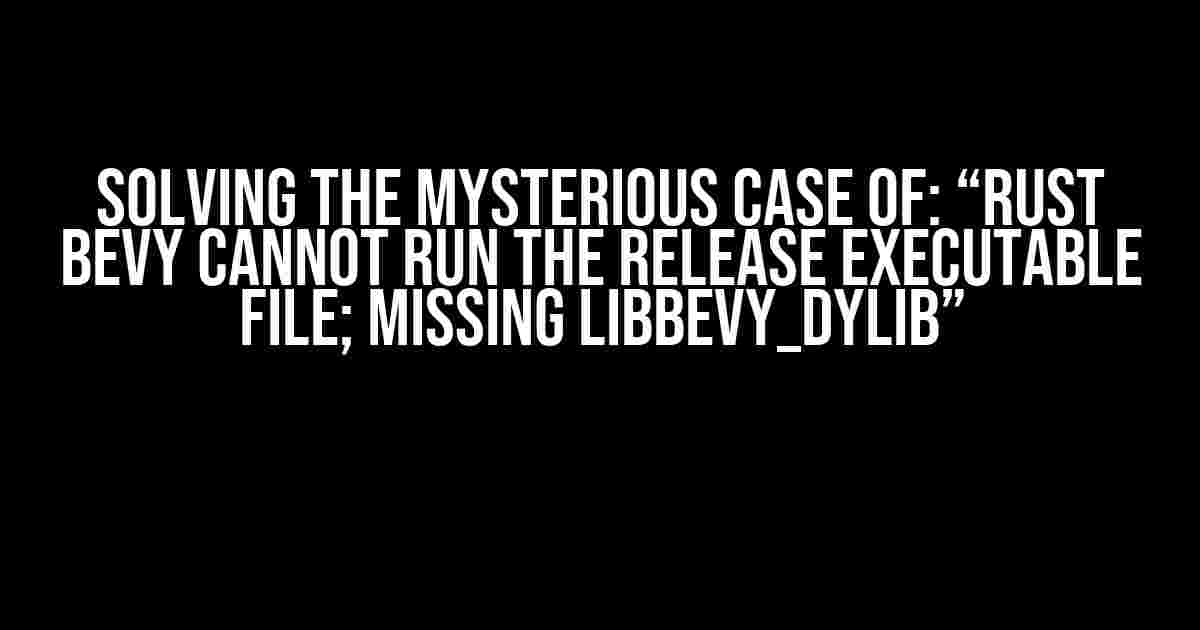If you’re reading this article, chances are you’ve stumbled upon one of the most frustrating errors in the Rust Bevy ecosystem: “Rust Bevy cannot run the release executable file; missing libbevy_dylib”. Fear not, dear developer, for we’re about to embark on a thrilling adventure to solve this enigma once and for all!
What’s the Problem, Anyway?
Before we dive into the solution, let’s take a step back and understand what’s happening behind the scenes. When you run `cargo build –release`, Bevy generates a shiny new executable file for your project. However, when you try to run this executable, you’re greeted with the dreaded error message:
Rust Bevy cannot run the release executable file; missing libbevy_dylib
The error is telling us that the executable can’t find the `libbevy_dylib` library, which is a critical component of the Bevy engine. But why is this happening?
The Culprit: Dynamic Linking
The issue lies in how Rust and Bevy handle dynamic linking. When you build your project with `cargo build –release`, Rust generates a statically linked executable. This means that all the necessary libraries, including Bevy, are bundled into a single executable file. However, Bevy uses dynamic linking to load its dependencies, including the `libbevy_dylib` library.
When you run the executable, Bevy tries to dynamically link against `libbevy_dylib`, but it can’t find it because it’s not included in the executable. This is where the error originates.
Fixing the Problem: The Ultimate Guide
Now that we understand the root cause, it’s time to get our hands dirty and fix this issue once and for all! Follow these steps carefully, and you’ll be back to developing your Bevy project in no time.
Step 1: Update Your `Cargo.toml` File
Open your `Cargo.toml` file and add the following lines:
[dependencies.bevy] version = "0.9.0" features = ["dylib"]
The `dylib` feature tells Bevy to build the `libbevy_dylib` library as a dynamic library.
Step 2: Run `cargo build –release` with the `–manifest-path` Flag
Instead of running `cargo build –release` directly, use the following command:
cargo build --release --manifest-path=Cargo.toml
This flag tells Cargo to use the `Cargo.toml` file in the current directory, ensuring that the `dylib` feature is enabled.
Step 3: Find the `libbevy_dylib` Library
After running the command in Step 2, navigate to your project’s `target/release` directory. You should see a file named `libbevy_dylib.dylib` (on macOS) or `libbevy_dylib.so` (on Linux). This is the dynamic library that Bevy needs to run.
Step 4: Set the `DYLD_LIBRARY_PATH` Environment Variable
On macOS, set the `DYLD_LIBRARY_PATH` environment variable to point to the directory containing the `libbevy_dylib.dylib` file:
export DYLD_LIBRARY_PATH=$PWD/target/release:$DYLD_LIBRARY_PATH
On Linux, set the `LD_LIBRARY_PATH` environment variable instead:
export LD_LIBRARY_PATH=$PWD/target/release:$LD_LIBRARY_PATH
This tells Bevy where to find the `libbevy_dylib` library.
Step 5: Run Your Executable with the `–dylib` Flag
Finally, run your executable with the `–dylib` flag:
./my_bevey_project --dylib
This flag tells Bevy to use the dynamic library instead of trying to statically link against it.
Troubleshooting and FAQs
If you’re still encountering issues, take a look at these common troubleshooting tips and FAQs:
| Issue | Solution |
|---|---|
| Cannot find `libbevy_dylib.dylib` on macOS | Check that you’ve updated your `Cargo.toml` file and run `cargo build –release –manifest-path=Cargo.toml` correctly. |
| Getting “permission denied” errors on Linux | Try running the executable with `sudo` or adjust the permissions on the `target/release` directory. |
| Error message still persists after following the steps | Double-check that you’ve set the `DYLD_LIBRARY_PATH` or `LD_LIBRARY_PATH` environment variable correctly. |
Conclusion
Congratulations, brave developer! You’ve overcome the “Rust Bevy cannot run the release executable file; missing libbevy_dylib” hurdle. With these steps, you should now be able to run your Bevy project’s release executable without any issues.
Remember, when dealing with dynamic linking and libraries, it’s essential to pay attention to the intricacies of Rust and Bevy’s build processes. By following this guide, you’ll be well on your way to creating stunning games and applications with Bevy.
Happy coding, and may the Bevy force be with you!
Here is the FAQ about “Rust Bevy cannot run the release executable file; missing libbevy_dylib” in HTML format:
Frequently Asked Question
Stuck with the infamous “Rust Bevy cannot run the release executable file; missing libbevy_dylib” error? Fear not, dear developer! We’ve got you covered with these frequently asked questions and answers.
What is this error about, and why is it happening?
The “Rust Bevy cannot run the release executable file; missing libbevy_dylib” error occurs when Bevy, a Rust-based game engine, fails to find the necessary dynamic library (libbevy_dylib) required to execute the release executable file. This usually happens when the library is not properly linked or is missing from the system.
How do I fix the missing libbevy_dylib error on macOS?
On macOS, you can resolve the issue by installing the `libbevy_dylib` library using Homebrew by running the command `brew install bevy`. This will install the required library, and you should be able to run the release executable file without any issues.
What about on Linux? How do I fix the error?
On Linux, you can fix the error by installing the `libbevy-dev` package using your distribution’s package manager. For example, on Ubuntu-based systems, run `sudo apt-get install libbevy-dev`. This will install the required development package, which includes the necessary library files.
I’m on Windows; how do I resolve the missing libbevy_dylib error?
On Windows, you can fix the error by ensuring that the Bevy engine is properly installed and configured. Check that you have installed the Bevy engine correctly and that the required DLL files are present in the system’s PATH. If you’re still facing issues, try reinstalling Bevy or seeking help from the Bevy community.
Is there a way to avoid this error in the future?
To avoid this error in the future, make sure to properly configure and install Bevy on your system. Always check the Bevy installation instructions and ensure that you have the required dependencies installed. Additionally, keep your system and Bevy engine up-to-date to avoid any compatibility issues.
